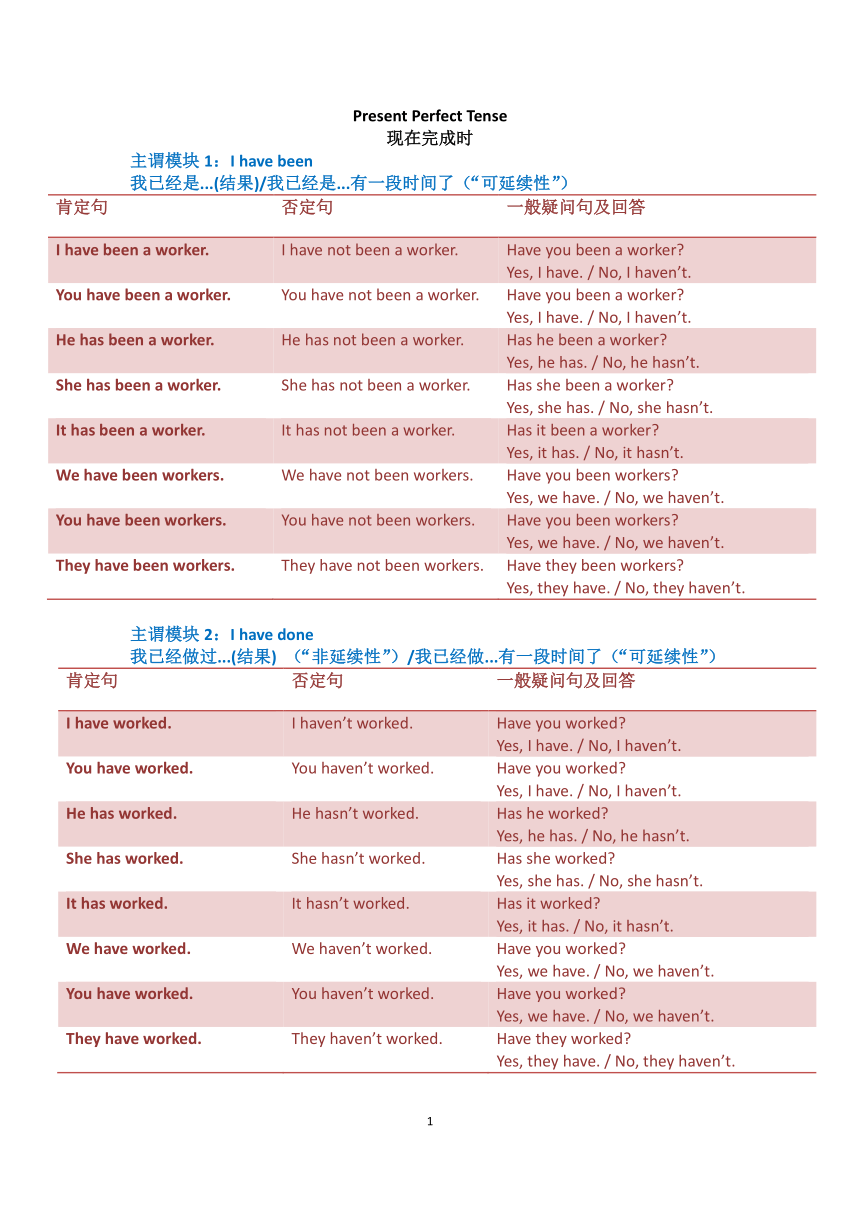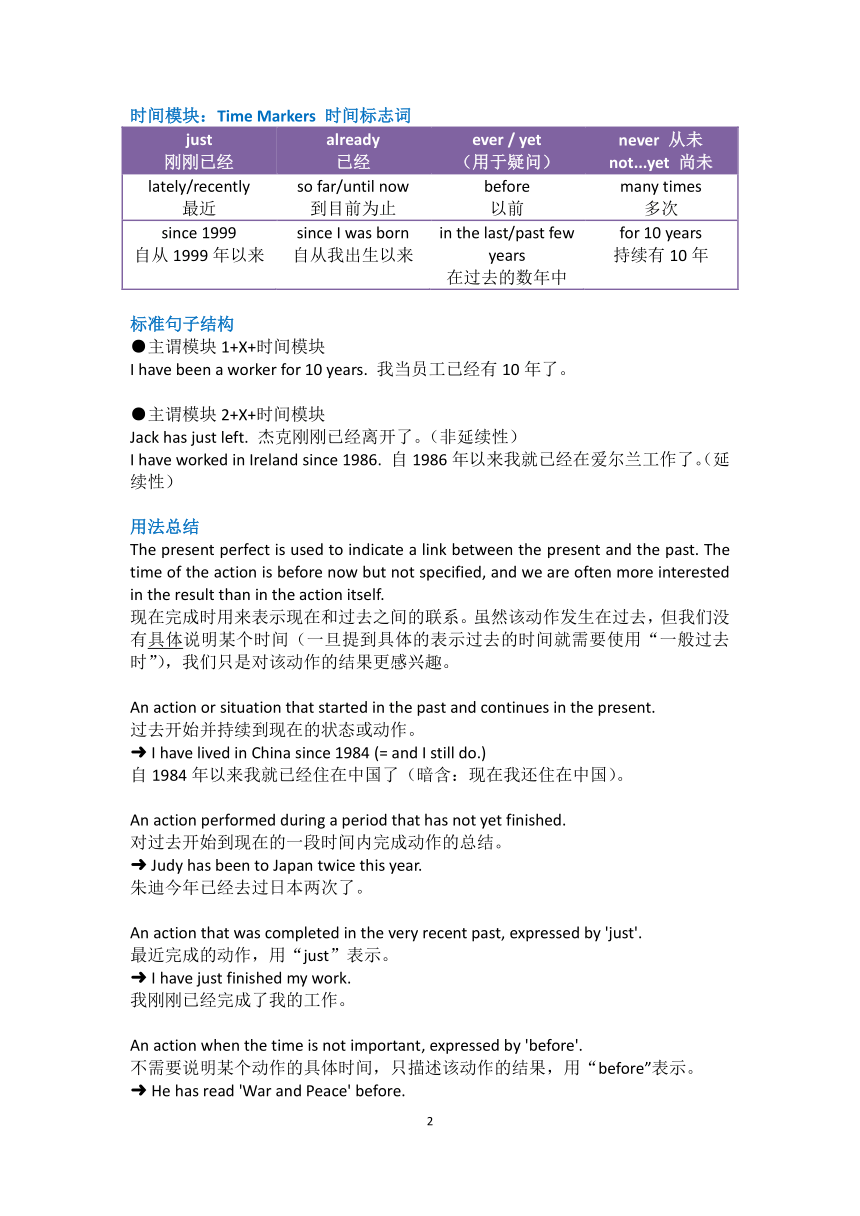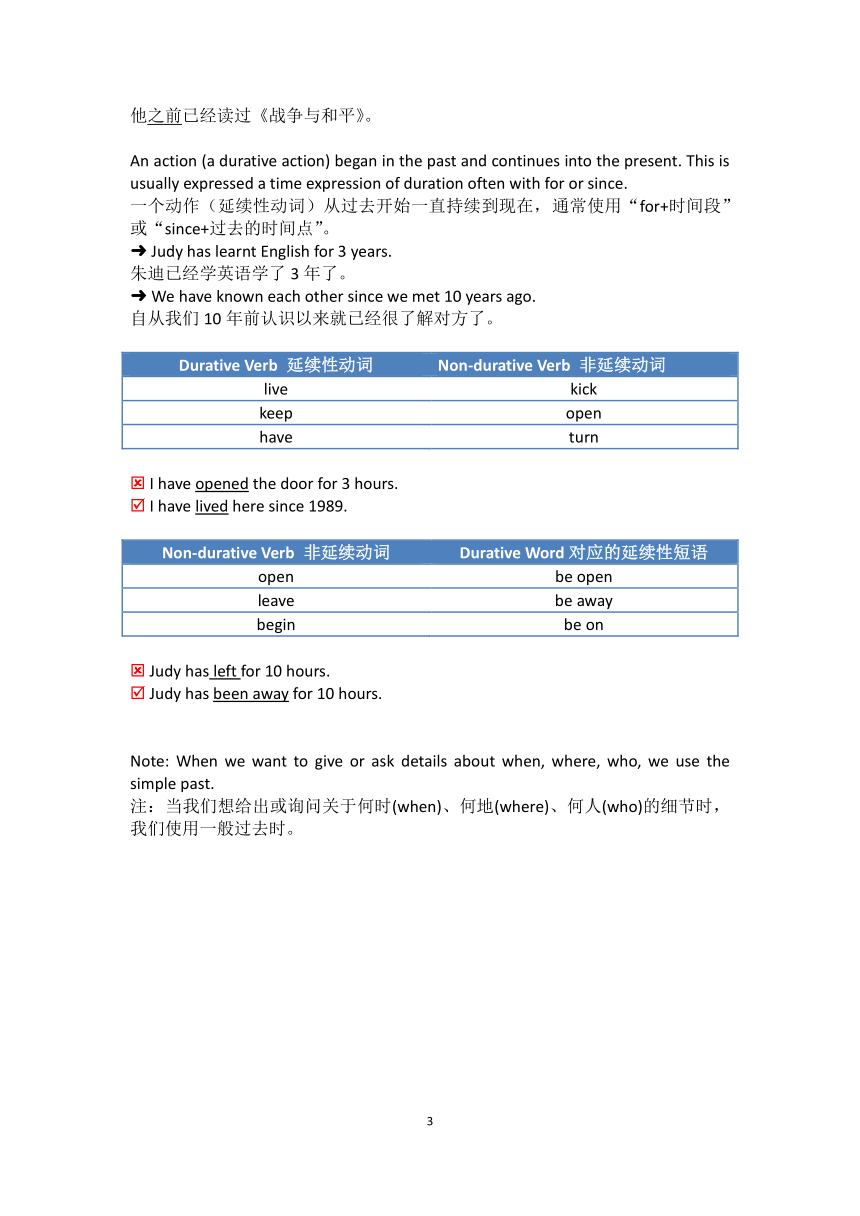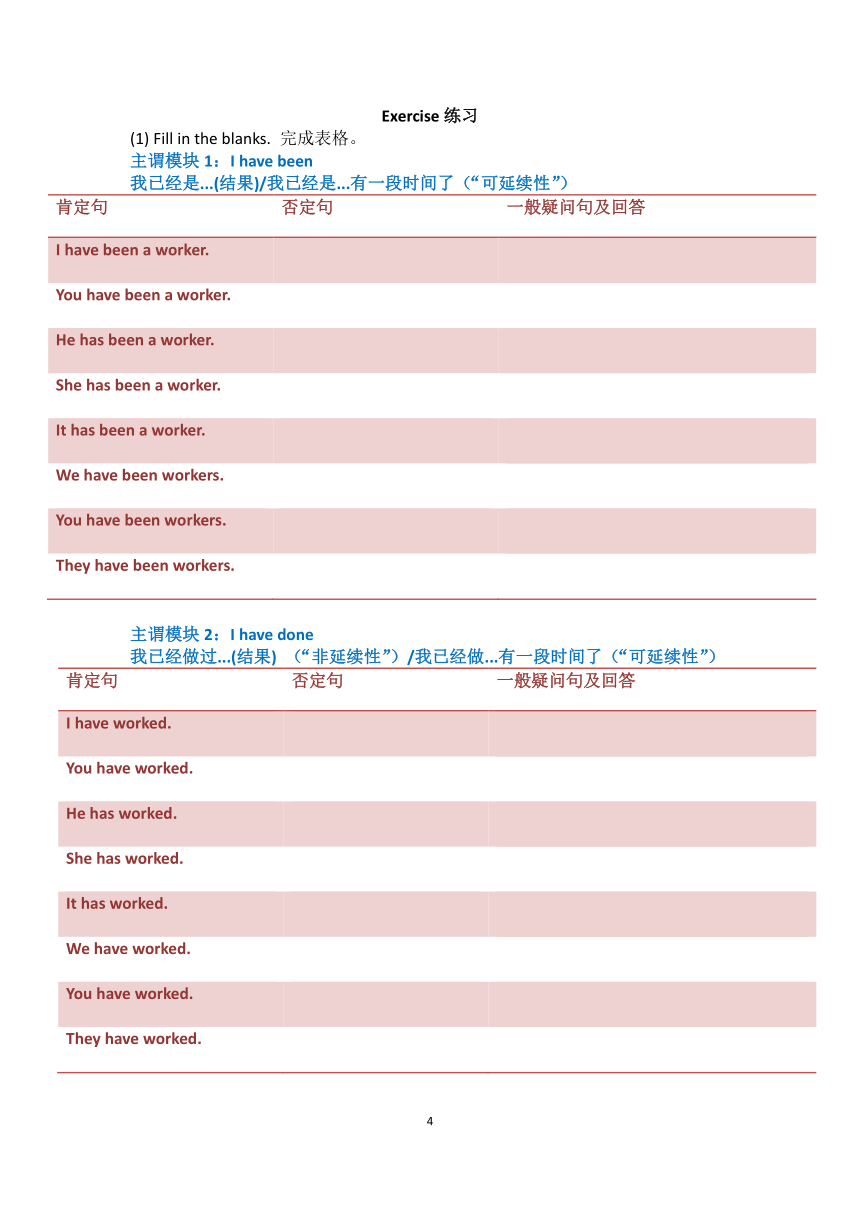高考英语专项 语法 时态 7 现在完成时 讲解+练习+答案 present perfect
文档属性
| 名称 | 高考英语专项 语法 时态 7 现在完成时 讲解+练习+答案 present perfect |  | |
| 格式 | |||
| 文件大小 | 327.5KB | ||
| 资源类型 | 试卷 | ||
| 版本资源 | 通用版 | ||
| 科目 | 英语 | ||
| 更新时间 | 2024-03-06 14:59:25 | ||
图片预览




文档简介
Present Perfect Tense
现在完成时
主谓模块 1:I have been
我已经是...(结果)/我已经是...有一段时间了(“可延续性”)
肯定句 否定句 一般疑问句及回答
I have been a worker. I have not been a worker. Have you been a worker
Yes, I have. / No, I haven’t.
You have been a worker. You have not been a worker. Have you been a worker
Yes, I have. / No, I haven’t.
He has been a worker. He has not been a worker. Has he been a worker
Yes, he has. / No, he hasn’t.
She has been a worker. She has not been a worker. Has she been a worker
Yes, she has. / No, she hasn’t.
It has been a worker. It has not been a worker. Has it been a worker
Yes, it has. / No, it hasn’t.
We have been workers. We have not been workers. Have you been workers
Yes, we have. / No, we haven’t.
You have been workers. You have not been workers. Have you been workers
Yes, we have. / No, we haven’t.
They have been workers. They have not been workers. Have they been workers
Yes, they have. / No, they haven’t.
主谓模块 2:I have done
我已经做过...(结果) (“非延续性”)/我已经做...有一段时间了(“可延续性”)
肯定句 否定句 一般疑问句及回答
I have worked. I haven’t worked. Have you worked
Yes, I have. / No, I haven’t.
You have worked. You haven’t worked. Have you worked
Yes, I have. / No, I haven’t.
He has worked. He hasn’t worked. Has he worked
Yes, he has. / No, he hasn’t.
She has worked. She hasn’t worked. Has she worked
Yes, she has. / No, she hasn’t.
It has worked. It hasn’t worked. Has it worked
Yes, it has. / No, it hasn’t.
We have worked. We haven’t worked. Have you worked
Yes, we have. / No, we haven’t.
You have worked. You haven’t worked. Have you worked
Yes, we have. / No, we haven’t.
They have worked. They haven’t worked. Have they worked
Yes, they have. / No, they haven’t.
1
时间模块:Time Markers 时间标志词
just already ever / yet never 从未
刚刚已经 已经 (用于疑问) not...yet 尚未
lately/recently so far/until now before many times
最近 到目前为止 以前 多次
since 1999 since I was born in the last/past few for 10 years
自从 1999 年以来 自从我出生以来 years 持续有 10 年
在过去的数年中
标准句子结构
●主谓模块 1+X+时间模块
I have been a worker for 10 years. 我当员工已经有 10 年了。
●主谓模块 2+X+时间模块
Jack has just left. 杰克刚刚已经离开了。(非延续性)
I have worked in Ireland since 1986. 自 1986 年以来我就已经在爱尔兰工作了。(延
续性)
用法总结
The present perfect is used to indicate a link between the present and the past. The
time of the action is before now but not specified, and we are often more interested
in the result than in the action itself.
现在完成时用来表示现在和过去之间的联系。虽然该动作发生在过去,但我们没
有具体说明某个时间(一旦提到具体的表示过去的时间就需要使用“一般过去
时”),我们只是对该动作的结果更感兴趣。
An action or situation that started in the past and continues in the present.
过去开始并持续到现在的状态或动作。
I have lived in China since 1984 (= and I still do.)
自 1984 年以来我就已经住在中国了(暗含:现在我还住在中国)。
An action performed during a period that has not yet finished.
对过去开始到现在的一段时间内完成动作的总结。
Judy has been to Japan twice this year.
朱迪今年已经去过日本两次了。
An action that was completed in the very recent past, expressed by 'just'.
最近完成的动作,用“just”表示。
I have just finished my work.
我刚刚已经完成了我的工作。
An action when the time is not important, expressed by 'before'.
不需要说明某个动作的具体时间,只描述该动作的结果,用“before”表示。
He has read 'War and Peace' before.
2
他之前已经读过《战争与和平》。
An action (a durative action) began in the past and continues into the present. This is
usually expressed a time expression of duration often with for or since.
一个动作(延续性动词)从过去开始一直持续到现在,通常使用“for+时间段”
或“since+过去的时间点”。
Judy has learnt English for 3 years.
朱迪已经学英语学了 3 年了。
We have known each other since we met 10 years ago.
自从我们 10 年前认识以来就已经很了解对方了。
Durative Verb 延续性动词 Non-durative Verb 非延续动词
live kick
keep open
have turn
I have opened the door for 3 hours.
I have lived here since 1989.
Non-durative Verb 非延续动词 Durative Word 对应的延续性短语
open be open
leave be away
begin be on
Judy has left for 10 hours.
Judy has been away for 10 hours.
Note: When we want to give or ask details about when, where, who, we use the
simple past.
注:当我们想给出或询问关于何时(when)、何地(where)、何人(who)的细节时,
我们使用一般过去时。
3
Exercise 练习
(1) Fill in the blanks. 完成表格。
主谓模块 1:I have been
我已经是...(结果)/我已经是...有一段时间了(“可延续性”)
肯定句 否定句 一般疑问句及回答
I have been a worker.
You have been a worker.
He has been a worker.
She has been a worker.
It has been a worker.
We have been workers.
You have been workers.
They have been workers.
主谓模块 2:I have done
我已经做过...(结果) (“非延续性”)/我已经做...有一段时间了(“可延续性”)
肯定句 否定句 一般疑问句及回答
I have worked.
You have worked.
He has worked.
She has worked.
It has worked.
We have worked.
You have worked.
They have worked.
4
时间模块:Time Markers 时间标志词
/ 从未
刚刚已经 已经 (用于疑问) 尚未
/ /
最近 到目前为止 以前 多次
自从 1999 年以来 自从我出生以来 在过去的数年中 持续有 10 年
(3) Write down the past participle forms of the following verbs.
写出下列动词的过去分词形式。
1 come _____________ 7 walk _____________
2 get _____________ 8 make _____________
3 stay _____________ 9 give _____________
4 go _____________ 10 put _____________.
5 do _____________ 11 seem _____________
6 let _____________ 12 be _____________
(4) Complete the sentences with the Past Simple form of the verb in brackets.
用所给动词的正确形式填空。
1 Judy_____________ (live) in China since 2016.
2 I still _____________ (not find ) my cell phone yet.
3 _____________you _____________ (ever see) the movie A Beautiful Mind
4 Judy _____________ (keep) a pet since she was a little girl.
5 Last year Judy _____________ (go) to Canada.
6 They _____________ (be) pretty poor for quite some time.
(5) Put the words in order according to the passage.
参照短文,将下列乱序的单词重新组成短文中的句子。(注意字母的大小写和标
点符号。)
Recently it has snowed / in Judy’s town.
In the last week, it has snowed / three times or more.
Judy has always loved the snow.
She has played in the snow a / lot of times before.
Judy has a pet dog. His name is Spot.
Spot has never played in the snow before.
This is Spot’s first snow he’s excited to see.
However, he has not felt / the cold before.
Judy has just received a sled for Christmas.
She puts on her warm clothes / and snow gloves.
She pulls the sled up the snow-capped hill.
Spot has run outside with Judy / whom he loves.
5
Spot has followed Judy all the / way up the hill.
He feels good. Judy has finally reached the top.
She sits on her sled. She rides down the hill.
Spot runs beside the sled that can’t seem to stop.
They have finally reached the bottom of the hill.
Spot has followed Judy all the / way down the hill.
Spot has decided that he likes / the snow too.
He says, “I have never experienced such a thrill.”
1 has recently town it in snowed Judy’s
_________________________________________________________________
2 a such experienced I never have thrill
_________________________________________________________________
3 for a Christmas sled just Judy received has
_________________________________________________________________
4 snow the in played never before has Spot
_________________________________________________________________
5 more or times three snowed has it week last the in
_________________________________________________________________
(6) Correct the mistakes in the following sentences.
用下划线勾出句中用错的动词并改正在句后的括号里。
1 Judy has gotten up for 2 hours. ( )
2 When have you buy the guitar ( )
3 Have Judy gone to school yet ( )
4 They have learn some Japanese lately. ( )
5 I am in China for a long time. ( )
6 The store has opened since 1999. ( )
7 Does Judy live in Ireland then ( )
8 I have never hear of that before. ( )
9 Has you ever been to the Great Wall before ( )
10 Judy go to school every morning. ( )
6
Key 答案
(1)(2)答案见讲解部分。
(3) Write down the past participle forms of the following verbs.
写出下列动词的过去分词形式。
1 come _____come________ 7 walk _____walked________
2 get _____gotten________ 8 make ____made_________
3 stay _____stayed________ 9 give _____given________
4 go ______gone_______ 10 put ______put_______.
5 do _____done________ 11 seem _____seemed________
6 let _____let________ 12 be ______been_______
(4) Complete the sentences with the Past Simple form of the verb in brackets.
用所给动词的正确形式填空。
1 Judy_____has lived________ (live) in China since 2016.
2 I still ____haven’t found_________ (not find ) my cell phone yet.
3 ____Have___you _____ever seen________ (ever see) the movie A Beautiful Mind
4 Judy _____has kept________ (keep) a pet since she was a little girl.
5 Last year Judy ____went_________ (go) to Canada.
6 They _____have been________ (be) pretty poor for quite some time.
(5) Put the words in order according to the passage.
参照短文,将下列乱序的单词重新组成短文中的句子。(注意字母的大小写和标
点符号。)
1 has recently town it in snowed Judy’s
Recently it has snowed in Judy’s town.
2 a such experienced I never have thrill
I have never experienced such a thrill.
3 for a Christmas sled just Judy received has
Judy has just received a sled for Christmas.
4 snow the in played never before has Spot
Spot has never played in the snow before.
5 more or times three snowed has it week last the in
In the last week, it has snowed three times or more.
(6) Correct the mistakes in the following sentences.
用下划线勾出句中用错的动词并改正在句后的括号里。
1 Judy has gotten up for 2 hours. ( been )
2 When have you buy the guitar ( did )
3 Have Judy gone to school yet ( Has )
7
4 They have learn some Japanese lately. ( learnt/learned )
5 I am in China for a long time. ( have been )
6 The store has opened since 1999. ( been open )
7 Does Judy live in Ireland then ( Did )
8 I have never hear of that before. ( heard )
9 Has you ever been to the Great Wall before ( Have )
10 Judy go to school every morning. ( goes )
8
现在完成时
主谓模块 1:I have been
我已经是...(结果)/我已经是...有一段时间了(“可延续性”)
肯定句 否定句 一般疑问句及回答
I have been a worker. I have not been a worker. Have you been a worker
Yes, I have. / No, I haven’t.
You have been a worker. You have not been a worker. Have you been a worker
Yes, I have. / No, I haven’t.
He has been a worker. He has not been a worker. Has he been a worker
Yes, he has. / No, he hasn’t.
She has been a worker. She has not been a worker. Has she been a worker
Yes, she has. / No, she hasn’t.
It has been a worker. It has not been a worker. Has it been a worker
Yes, it has. / No, it hasn’t.
We have been workers. We have not been workers. Have you been workers
Yes, we have. / No, we haven’t.
You have been workers. You have not been workers. Have you been workers
Yes, we have. / No, we haven’t.
They have been workers. They have not been workers. Have they been workers
Yes, they have. / No, they haven’t.
主谓模块 2:I have done
我已经做过...(结果) (“非延续性”)/我已经做...有一段时间了(“可延续性”)
肯定句 否定句 一般疑问句及回答
I have worked. I haven’t worked. Have you worked
Yes, I have. / No, I haven’t.
You have worked. You haven’t worked. Have you worked
Yes, I have. / No, I haven’t.
He has worked. He hasn’t worked. Has he worked
Yes, he has. / No, he hasn’t.
She has worked. She hasn’t worked. Has she worked
Yes, she has. / No, she hasn’t.
It has worked. It hasn’t worked. Has it worked
Yes, it has. / No, it hasn’t.
We have worked. We haven’t worked. Have you worked
Yes, we have. / No, we haven’t.
You have worked. You haven’t worked. Have you worked
Yes, we have. / No, we haven’t.
They have worked. They haven’t worked. Have they worked
Yes, they have. / No, they haven’t.
1
时间模块:Time Markers 时间标志词
just already ever / yet never 从未
刚刚已经 已经 (用于疑问) not...yet 尚未
lately/recently so far/until now before many times
最近 到目前为止 以前 多次
since 1999 since I was born in the last/past few for 10 years
自从 1999 年以来 自从我出生以来 years 持续有 10 年
在过去的数年中
标准句子结构
●主谓模块 1+X+时间模块
I have been a worker for 10 years. 我当员工已经有 10 年了。
●主谓模块 2+X+时间模块
Jack has just left. 杰克刚刚已经离开了。(非延续性)
I have worked in Ireland since 1986. 自 1986 年以来我就已经在爱尔兰工作了。(延
续性)
用法总结
The present perfect is used to indicate a link between the present and the past. The
time of the action is before now but not specified, and we are often more interested
in the result than in the action itself.
现在完成时用来表示现在和过去之间的联系。虽然该动作发生在过去,但我们没
有具体说明某个时间(一旦提到具体的表示过去的时间就需要使用“一般过去
时”),我们只是对该动作的结果更感兴趣。
An action or situation that started in the past and continues in the present.
过去开始并持续到现在的状态或动作。
I have lived in China since 1984 (= and I still do.)
自 1984 年以来我就已经住在中国了(暗含:现在我还住在中国)。
An action performed during a period that has not yet finished.
对过去开始到现在的一段时间内完成动作的总结。
Judy has been to Japan twice this year.
朱迪今年已经去过日本两次了。
An action that was completed in the very recent past, expressed by 'just'.
最近完成的动作,用“just”表示。
I have just finished my work.
我刚刚已经完成了我的工作。
An action when the time is not important, expressed by 'before'.
不需要说明某个动作的具体时间,只描述该动作的结果,用“before”表示。
He has read 'War and Peace' before.
2
他之前已经读过《战争与和平》。
An action (a durative action) began in the past and continues into the present. This is
usually expressed a time expression of duration often with for or since.
一个动作(延续性动词)从过去开始一直持续到现在,通常使用“for+时间段”
或“since+过去的时间点”。
Judy has learnt English for 3 years.
朱迪已经学英语学了 3 年了。
We have known each other since we met 10 years ago.
自从我们 10 年前认识以来就已经很了解对方了。
Durative Verb 延续性动词 Non-durative Verb 非延续动词
live kick
keep open
have turn
I have opened the door for 3 hours.
I have lived here since 1989.
Non-durative Verb 非延续动词 Durative Word 对应的延续性短语
open be open
leave be away
begin be on
Judy has left for 10 hours.
Judy has been away for 10 hours.
Note: When we want to give or ask details about when, where, who, we use the
simple past.
注:当我们想给出或询问关于何时(when)、何地(where)、何人(who)的细节时,
我们使用一般过去时。
3
Exercise 练习
(1) Fill in the blanks. 完成表格。
主谓模块 1:I have been
我已经是...(结果)/我已经是...有一段时间了(“可延续性”)
肯定句 否定句 一般疑问句及回答
I have been a worker.
You have been a worker.
He has been a worker.
She has been a worker.
It has been a worker.
We have been workers.
You have been workers.
They have been workers.
主谓模块 2:I have done
我已经做过...(结果) (“非延续性”)/我已经做...有一段时间了(“可延续性”)
肯定句 否定句 一般疑问句及回答
I have worked.
You have worked.
He has worked.
She has worked.
It has worked.
We have worked.
You have worked.
They have worked.
4
时间模块:Time Markers 时间标志词
/ 从未
刚刚已经 已经 (用于疑问) 尚未
/ /
最近 到目前为止 以前 多次
自从 1999 年以来 自从我出生以来 在过去的数年中 持续有 10 年
(3) Write down the past participle forms of the following verbs.
写出下列动词的过去分词形式。
1 come _____________ 7 walk _____________
2 get _____________ 8 make _____________
3 stay _____________ 9 give _____________
4 go _____________ 10 put _____________.
5 do _____________ 11 seem _____________
6 let _____________ 12 be _____________
(4) Complete the sentences with the Past Simple form of the verb in brackets.
用所给动词的正确形式填空。
1 Judy_____________ (live) in China since 2016.
2 I still _____________ (not find ) my cell phone yet.
3 _____________you _____________ (ever see) the movie A Beautiful Mind
4 Judy _____________ (keep) a pet since she was a little girl.
5 Last year Judy _____________ (go) to Canada.
6 They _____________ (be) pretty poor for quite some time.
(5) Put the words in order according to the passage.
参照短文,将下列乱序的单词重新组成短文中的句子。(注意字母的大小写和标
点符号。)
Recently it has snowed / in Judy’s town.
In the last week, it has snowed / three times or more.
Judy has always loved the snow.
She has played in the snow a / lot of times before.
Judy has a pet dog. His name is Spot.
Spot has never played in the snow before.
This is Spot’s first snow he’s excited to see.
However, he has not felt / the cold before.
Judy has just received a sled for Christmas.
She puts on her warm clothes / and snow gloves.
She pulls the sled up the snow-capped hill.
Spot has run outside with Judy / whom he loves.
5
Spot has followed Judy all the / way up the hill.
He feels good. Judy has finally reached the top.
She sits on her sled. She rides down the hill.
Spot runs beside the sled that can’t seem to stop.
They have finally reached the bottom of the hill.
Spot has followed Judy all the / way down the hill.
Spot has decided that he likes / the snow too.
He says, “I have never experienced such a thrill.”
1 has recently town it in snowed Judy’s
_________________________________________________________________
2 a such experienced I never have thrill
_________________________________________________________________
3 for a Christmas sled just Judy received has
_________________________________________________________________
4 snow the in played never before has Spot
_________________________________________________________________
5 more or times three snowed has it week last the in
_________________________________________________________________
(6) Correct the mistakes in the following sentences.
用下划线勾出句中用错的动词并改正在句后的括号里。
1 Judy has gotten up for 2 hours. ( )
2 When have you buy the guitar ( )
3 Have Judy gone to school yet ( )
4 They have learn some Japanese lately. ( )
5 I am in China for a long time. ( )
6 The store has opened since 1999. ( )
7 Does Judy live in Ireland then ( )
8 I have never hear of that before. ( )
9 Has you ever been to the Great Wall before ( )
10 Judy go to school every morning. ( )
6
Key 答案
(1)(2)答案见讲解部分。
(3) Write down the past participle forms of the following verbs.
写出下列动词的过去分词形式。
1 come _____come________ 7 walk _____walked________
2 get _____gotten________ 8 make ____made_________
3 stay _____stayed________ 9 give _____given________
4 go ______gone_______ 10 put ______put_______.
5 do _____done________ 11 seem _____seemed________
6 let _____let________ 12 be ______been_______
(4) Complete the sentences with the Past Simple form of the verb in brackets.
用所给动词的正确形式填空。
1 Judy_____has lived________ (live) in China since 2016.
2 I still ____haven’t found_________ (not find ) my cell phone yet.
3 ____Have___you _____ever seen________ (ever see) the movie A Beautiful Mind
4 Judy _____has kept________ (keep) a pet since she was a little girl.
5 Last year Judy ____went_________ (go) to Canada.
6 They _____have been________ (be) pretty poor for quite some time.
(5) Put the words in order according to the passage.
参照短文,将下列乱序的单词重新组成短文中的句子。(注意字母的大小写和标
点符号。)
1 has recently town it in snowed Judy’s
Recently it has snowed in Judy’s town.
2 a such experienced I never have thrill
I have never experienced such a thrill.
3 for a Christmas sled just Judy received has
Judy has just received a sled for Christmas.
4 snow the in played never before has Spot
Spot has never played in the snow before.
5 more or times three snowed has it week last the in
In the last week, it has snowed three times or more.
(6) Correct the mistakes in the following sentences.
用下划线勾出句中用错的动词并改正在句后的括号里。
1 Judy has gotten up for 2 hours. ( been )
2 When have you buy the guitar ( did )
3 Have Judy gone to school yet ( Has )
7
4 They have learn some Japanese lately. ( learnt/learned )
5 I am in China for a long time. ( have been )
6 The store has opened since 1999. ( been open )
7 Does Judy live in Ireland then ( Did )
8 I have never hear of that before. ( heard )
9 Has you ever been to the Great Wall before ( Have )
10 Judy go to school every morning. ( goes )
8
同课章节目录
- 名词
- 动词/动词短语
- 一般现在时及其被动式
- 一般过去时及其被动式
- 现在进行时及其被动式
- 过去进行时及其被动式
- 将来进行时及其被动式
- 现在完成时及其被动式
- 过去完成时及其被动式
- 一般将来时及其被动式
- 过去将来时及其被动式
- 现在完成进行时及其被动式
- 将来完成时及其被动式
- 副词
- 介词/介词短语
- 连词/连接词
- 数词/量词
- 冠词
- 形容词
- 非谓语动词
- 句型
- 简单句与并列句
- 复合句
- 主谓一致
- 倒装与省略
- 强调句
- 虚拟语气
- 插入语
- 固定句型
- 祈使句/感叹句
- 疑问句/反义疑问句
- 非限制性定语从句
- 句型转换
- 定语从句
- 表语从句
- 宾语从句
- 主语从句
- 动词时态与语态
- 虚拟语气与情态动词
- 主谓一致
- 独立主格结构、with的复合结构
- 情态动词
- 状语从句
- 定语从句
- 特殊句式
- 交际用语
- 代词/不定代词
- 名词性从句
- 同位语从句
- 表语从句
- 宾语从句
- 主语从句
- 直接引语和间接引语
- 构词法(word formation)
